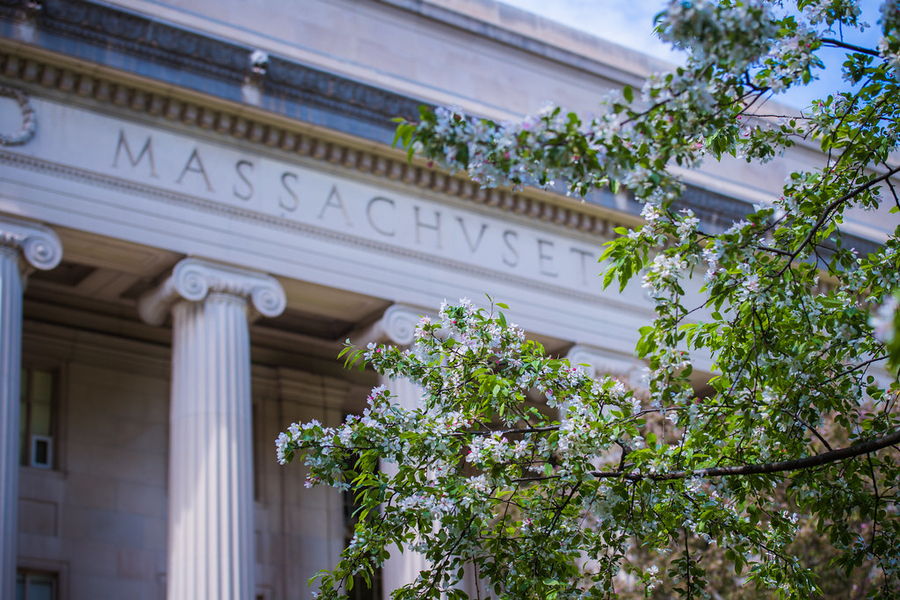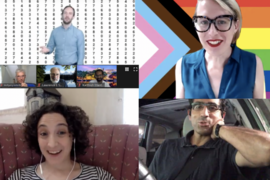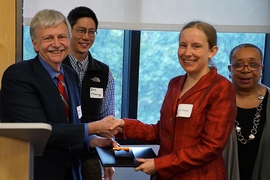This June, 23 faculty and instructors from over a dozen departments, labs, and centers across MIT were honored with Teaching with Digital Technology Awards in an online celebration hosted by the Office of Open Learning.
Established in 2016 and co-sponsored by MIT Open Learning and the Office of the Vice Chancellor, these awards were originally intended primarily as a means of recognizing innovative use of digital technologies in the context of MIT’s in-person, on-campus classes. But in the last two award cycles, during which nearly all residential courses have moved online, the awards have come to represent that and much more: the enduring yet ever-evolving spirit of collaboration and mutual support within the MIT community as faculty, students, and staff continue to grapple with the challenges presented by the Covid-19 pandemic.
“One of the things that really struck me during the celebration was how quickly and how often honorees attributed their success to the support they received from both students and colleagues,” says Sheryl Barnes, award founder and director for digital learning in residential education at MIT Open Learning. “It really says a lot about who we are as a community at MIT, and about these instructors — not just as academics, but as human beings.”
This year’s 23 winners were selected from among 230 nominations of 104 unique instructors. They are:
- Mohamed Abdelhafez – Physics
- Steve Banzaert – Mechanical Engineering
- Helena Belio-Apaolaza – Global Studies and Languages
- Joseph Doyle – MIT Sloan School of Management
- Kristin Forbes – MIT Sloan School of Management
- Laura Frawley – Brain and Cognitive Sciences
- Malick Ghachem – History
- Max Goldman – Electrical Engineering and Computer Science
- Sally Haslanger – Philosophy and D-Lab
- Caroline Jones – Architecture
- Miro Kazakoff – MIT Sloan School of Management
- Maria Khotimsky – Global Studies and Languages
- Andrew Lo – MIT Sloan School of Management
- Libby McDonald – D-Lab
- Arathi Mehrotra – MIT Sloan School of Management
- Anna Mikusheva – Economics
- Jeremy Orloff – Mathematics
- Michael Short – Nuclear Science and Engineering
- Justin Solomon – Electrical Engineering and Computer Science
- Joe Steinmeyer – Electrical Engineering and Computer Science
- Nikolaos Trichakis – MIT Sloan School of Management
- Adrien Verdelhan – MIT Sloan School of Management
- Sean Willems – MIT Sloan School of Management
“It’s the role of the students that makes this, to me, such a special award,” says Dean for Digital Learning Krishna Rajagopal. “The selection is led by students, based entirely upon nominations received from students.” In their nominations, students describe how an instructor used digital technologies to help improve their learning.
Some of this year’s honorees received praise for creating “a virtual experience that resembled in-person learning,” expertly using technology to lead students’ focus to one topic at a time in a complex online environment. Some classes were handled so well as to beat out in-person experiences: “[My instructor] managed to make my only fully-virtual fall class my (and many others') favorite!” raved one student.
Other educators were praised for their flexibility in uncertain circumstances. One student wrote that her teacher was always “extremely receptive to what is and isn't working in the class,” and willing to adapt along with students’ needs and concerns.
Many students were moved by their professor’s commitment to their learning in spite of overwhelming challenges. “It was so wholly clear [my professor] cared,” wrote one nominating student. “His willingness to go above and beyond led to an online class experience leagues beyond any other course I have taken at MIT, and I cannot think of someone more deserving of recognition.”
A panel consisting of 15 students, Rajagopal, and Vice Chancellor Ian Waitz selected the awardees, with Rajagopal and Waitz leaving the decision-making almost entirely to the students, who were highly motivated to recognize and reward good teaching today with a view toward incentivizing it for tomorrow.
This student-driven process and their motivations are “major reasons that you should feel really proud to be receiving this award,” Rajagopal told the assembled honorees at the virtual award ceremony, noting that the Teaching with Digital Technology Award has “really served MIT well by giving our students a voice in identifying those instructors who are deserving of this recognition, and in so doing, providing a recognition to our instructors that is really prized.”
For 2021 honorees, maintaining students’ welfare and the integrity of their learning despite extraordinary circumstances was always top-of-mind. During a group reflection on the experience of teaching over the past academic year, professor of philosophy Sally Haslanger noted the challenge of addressing all areas of the expanded MIT motto in an ad hoc virtual setting: “The mind is easy, but how do you [fulfill] the hand and heart part?”
Some instructors brought a sense of playfulness to their classes that made online discussions more lively and memorable: MIT Sloan’s Andrew Lo took a cue from game show hosts, greeting wrong answers with the sound of a buzzer and each right answer with a bell. Others, feeling the loss of the immediacy of in-person class discussions, focused on building engagement in online spaces. Senior lecturer of global languages Maria Khotimsky moved away from the lecture format, turning more frequently to small group discussions, a technique she intends to keep once on-campus classes resume. “I think this entire year was spent looking for new tools that encourage collaboration and communication,” says Khomitsky, who was also recognized with the award in 2020.
Others found the experience of teaching during a pandemic forced them to reevaluate their teaching priorities to focus on the lessons that really matter: “Whatever you think may not be necessary, probably isn’t,” says lecturer of mathematics Jeremy Orloff, noting that streamlining learning materials is an approach he intends to maintain in future iterations of his courses.
Many cited the opportunity to experiment with new technologies and techniques as an unexpected, happy consequence of the past year’s strictures. Others attributed their teaching experiments’ success to their students, citing their perseverance and willingness to try new things. Global languages lecturer Helena Belio-Apaolaza went even further, expressing surprise at having been nominated for a Teaching with Digital Technology Award, given that she had learned so much about new technologies from her students over the past year.
For Waitz, this year’s awards are a clear indication that the community will return to campus stronger than ever once in-person instruction resumes in the fall. Over the course of the pandemic, he says, “We’ve seen much more empathy in both directions than we typically have between students and teachers. We got to look into each other’s homes and lives in a way we haven’t in the past. It has personalized us all in a new way, which ultimately will build stronger relationships and, I hope, more fulfilling educational experiences.”










